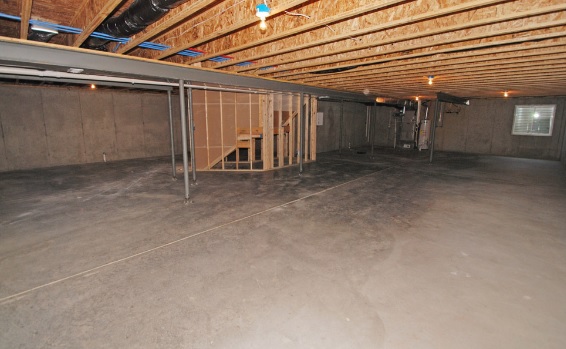The best basement wall sealer for sealing your basement walls will depend on the type of basement wall you have, the condition of the basement wall, and your reason for sealing the basement wall.
Sealing Cinderblock Basement Walls
You will never be able to waterproof a cinderblock basement wall with the use of a sealer alone. Water enters into the cinderblock through the exterior where it will either escape through the block or grout lines, or accumulate in the cinderblock at the bottom of the wall. Sealers are breathable and aren’t able to fully stop water or moisture movement, and if enough pressure builds up, paint and coatings will peel. Sealers should only be used on unfinished basements to reduce the movement of water of moisture. The most effective way to fully waterproof a cinderblock basement is with exterior drainage, exterior gutters, and exterior sealers and coatings.
Reduce movement of water: Sodium silicate sealers are the most common type of sealer for reducing the movement of water and efflorescence through the pores of the concrete. They chemically react to form a crystal-like barrier within the pores to reduce the size of the pores. The barrier will increase in size with the number of coats applied, but the pores will never be able to fully close as silicate sealers are considered to be breathable. If the cinderblock is damp, or showing signs of moisture issues, a silicate sealer will help to reduce the movement of the water and moisture through the pores.
- Armor S2000 Concrete Sealer Review (concentrated)
- RadonSeal Concrete Sealer Review (pre-diluted)
- Stone Technolgies X-1 Concrete Sealer Review (pre-diluted)
- Ashford Formula Concrete Sealer Review (pre-diluted)
Reduce movement of moisture: Sodium silicate sealers are often used to reduce moisture, but their primary purpose is to reduce water. A better sealer for moisture reduction is a high solids water based silane siloxane sealer (2-3 back to back coats).
- Armor SX5000 WB Concrete Sealer Review (average 5.0 star review)
- Siloxane PD Concrete Sealer Review (average 4.5 star review)
- DryWay Water Repellent Concrete Sealer Review (average 3.8 star review)
Silicate sealers and silane-siloxane sealers are often used together. A silicate sealer will be applied first followed by the application of a Silane-Siloxane sealer a week later.
A few other things to consider when sealing cinderblock basement walls:
- Make sure that all exterior waterproofing has been completed.
- Make sure the grout lines are all in tact.
- Make sure that any cracks are properly repaired with a crack repair material.
- Make sure that all coveseams are properly sealed/repaired with a crack repair material.
Sealing Poured Concrete Basement Walls
Poured concrete basement walls are easier to seal, making water and moisture reduction easier to control.
Reduce movement of water: Sodium silicate sealers are the most common type of sealer for reducing the movement of water and efflorescence through the pores of the concrete. They chemically react to form a crystal-like barrier within the pores to reduce the size of the pores. The barrier will increase in size with the number of coats applied, but the pores will never be able to fully close as silicate sealers are considered to be breathable. If the concrete is damp, or showing signs of moisture issues, a silicate sealer will help to reduce the movement of the water and moisture through the pores.
- Armor S2000 Concrete Sealer Review (concentrated)
- RadonSeal Concrete Sealer Review (pre-diluted)
- Stone Technolgies X-1 Concrete Sealer Review (pre-diluted)
- Ashford Formula Concrete Sealer Review (pre-diluted)
Reduce movement of moisture: Sodium silicate sealers are often used to reduce moisture, but their primary purpose is to reduce water. A better sealer for moisture reduction is a high solids water based silane siloxane sealer (2-3 back to back coats).
- Armor SX5000 WB Concrete Sealer Review (average 5.0 star review)
- Siloxane PD Concrete Sealer Review (average 4.5 star review)
- DryWay Water Repellent Concrete Sealer Review (average 3.8 star review)
Silicate sealers and silane-siloxane sealers are often used together. A silicate sealer will be applied first followed by the application of a Silane-Siloxane sealer a week later.
Stop movement of moisture: Sealers reduce and coatings stop. If you want or need to stop the movement of moisture through concrete then you need a moisture mitigating epoxy coating. Epoxy coatings will hold back moisture and stop it from entering into the basement.
- Armor Epoxy Coating: Water based 2-part epoxy primer and top coat in one. Will reduce moisture in concrete, and protect the concrete surface against staining and deterioration caused by surface abrasion. A higher solids version is available for consumers that need more moisture protection, or want to apply the epoxy in a color.
- Sherwin Williams Epoxy Coating: Ready to apply residential grade epoxy coating for concrete floors.
- Rust-Oleum Epoxy Coating: Ready to apply residential grade epoxy coating for concrete floors.
- Laticrete Epoxy: 2 part epoxy primer and top coat in one. Will reduce moisture in concrete and protect the concrete surface against staining and deterioration.
A few other things to consider when sealing concrete basement walls:
- Make sure that all exterior waterproofing has been completed.
- Make sure that any cracks are properly repaired with a crack repair material.
- Make sure that all coveseams are properly sealed/repaired with a crack repair material.

